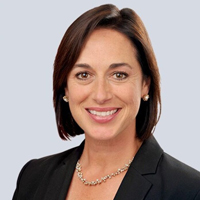On March 30, the Nashville Health Care Council hosted a virtual member discussion with Karen DeSalvo, M.D., Chief Health Officer at Google. Senator Bill Frist, M.D. moderated the conversation, which covered topics such as Google’s response to the COVID-19 pandemic, privacy in data sharing and how she sees the company’s role in shaping the future of health care.
DeSalvo has a diverse background as a physician executive working at the intersection of medicine, public health and information technology. Prior to joining Google, she was national coordinator for health information technology, and acted as the assistant secretary for health in the Obama Administration, in addition to holding a number of other important roles in the public sector.
When DeSalvo joined Google in late 2019, she was new to Silicon Valley, and was surprised how strongly wellbeing and health were embedded in the foundation of the company. She found the executives at Google to be passionate about helping people on their journey to better health, as the search engine and its subsidiaries are often the first place people begin to research their health needs.
“At Google, we talk a lot about being helpful. We are not replacing health care, but enabling,” said DeSalvo. “We want to be a strong partner to the medical and public health community.”
Pandemic Response
Shortly after she began her position, COVID-19 upended her immediate plans, just as it did for most people around the world. Google Health’s strategy had to evolve quickly, partnering with public health organizations to assist them in everything from communicating about the coronavirus to implementing prediction tools for resource allocation among communities.
“I’m no stranger to crisis and disaster,” said DeSalvo, who was the New Orleans Health Commissioner during Hurricane Katrina, and an HHS leader during the Ebola outbreak in 2014. “Even though I stepped into one role at Google, crisis response took over my and the whole company’s focus. As the place where people go for information and guidance, we have a huge responsibility.”
Accelerating Health Equity
DeSalvo pointed out that Google, like many other companies, is realizing the need for an inclusive lens at all levels – ideation, partnership, research, testing and implementation. They are building equity and inclusion into a framework, so that it’s not just a checkbox but a cultural way to do business. She hopes that these issues keep the country’s attention and that more accountability is demanded in the market.
“After Hurricane Katrina, everyone talked about how structural racism was a huge issue, but then everyone got distracted,” she said. “Fifteen years later, we have too much data that tells us these issues are built into the digital infrastructure, and it must be addressed.”
The Trust Factor
While the big tech firms have enormous power to do good in the world, their influence is still being questioned by consumers, physicians and government officials. DeSalvo remarked that she has conducted listening sessions with consumers to find out how Google can gain trust and be most helpful. She noted that most consumers say they want the same thing – authentic, informed consent about using their information.
“As a physician, I know that trust is where you have to start. If I don’t have that kind of relationship, they’re not going to share what I need to know to help them get better,” said DeSalvo. “In everything we do, we must be privacy promoting and protecting.”
She gave the example of an Apple partnership for COVID-19 digital contact tracing, which allows people to be notified if they’ve been near a person who tested positive. The company refused to use GPS for the initiative for privacy reasons and in the end, was able to build a better program while protecting individual privacy.
Battling misinformation
Google has a proactive approach to discerning between helpful and harmful content. For example, with YouTube, the company constantly scours the site for misinformation. They will take down anything that is downright false, but it’s the content in the middle that is difficult to remove. Their solution is to be content-forward. By putting the most helpful content at the top of search results, they hope to promote the most accurate and supportive information for consumers.
“In the beginning of the pandemic, we had 400 billion impressions of information about COVID. We took down 850,000 videos about it that we felt were harmful,” said DeSalvo. “As we move out of the pandemic, we’ll continue to put the best, most accurate content forward.”
Partnering for Success
Engaging the private sector with public health and government was essential during the COVID-19 crisis, and such partnerships will continue to be essential for the advancement of health.
“As the community goes, we all go. What’s happening on the ground in Nashville with public-private partnerships should be a model for the rest of the country. Think about health as an indicator for business attraction. These notions, which Nashville has acted on for decades, are becoming more understood,” she said.
She pointed out that, if partnerships and trust are not already established, disaster response can take longer. The private sector takes a lot of direction from the public sector with regard to science, leadership and policy. At the same time, the public sector can be reluctant to trust private businesses to create solutions. But if trust and bridges are already built, they can move quicker and save lives.
“I’m grateful that Dr. DeSalvo is in this important leadership role. From our work together in government, I know she understands that the private sector has a call to action to improve health care,” said Senator Frist. “I’m grateful that she recognizes the uniqueness of Nashville’s ecosystem, and the Nashville Health Care Council looks forward to any way we can support her work to make health care better for all.”
